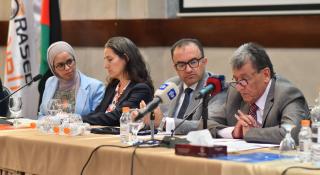Nazaha project - First meeting of the Advisory Board for the creation of a Self-Regulatory System for CSOs
Al Hayat-RASED organized on Monday 13 February the first meeting of the Advisory Board for the creation of a Self-Regulatory System for Civil Society Organizations. This meeting gathered key stakeholders from international organizations, development agencies, Jordanian CSOs and NGOs, and government entities.
On Monday 13 February, AL Hayat-RASED organized the first meeting of the Advisory Board, which will support the creation and implementation of a self-regulatory system to enhance governance standards and operational capacities of Jordanian CSOs.
This meeting was organized as part of the “Nazaha: EU Support to social accountability and Civil Society empowerment for better governance” project, co-funded by the EU and AECID, and implemented in partnership between Rasheed TI and Al Hayat-RASED. This project aims to strengthen the capacities and internal governance of CSOs and CBOs and enable them to play their role to hold the government accountable at the local and national levels.
As part of this project, the Advisory Board provides a platform to exchange and share knowledge between key practitioners on ways to support the dynamism of the Jordanian civil society and its role in enhancing social accountability.
As a technical support body, the Advisory Board will be associated in every step towards the creation and dissemination of a Code of Conduct, a Self-Regulatory System, and rewarding scheme for CSOs. Its role will notably include providing expertise, knowledge and technical advice to guide the elaboration process and validate the integrity & governance standards and principles.
During this meeting, participants confirmed their commitment to support the creation of a Self-Regulatory System for CSOs, which has a great potential to bring transformative change and empower the Jordanian civil society to enhance the trust with citizens and better engage with the all stakeholders and partners. They notably insisted on the multiple benefits that such a system could bear for all parties, by enhancing CSOs’ capacities, transparency and credibility, and expressed their willingness to support its development and dissemination.
The meeting was attended by international organizations and development actors (EU, AECID, USAID, UNDP, Expertise France), Jordanian CSOs and NGOs (Crown Prince Foundation, Rasheed TI, Opinions Without Borders, Chechen Women’s Society, Shabab Al Ghad Center, “I am Human” Society for the Rights of Persons with Disabilities, Information and Research Center - King Hussein Foundation (IRCKHF)), and government entities (Companies Control Department, Associations’ Registrar, JIACC), as observers.
